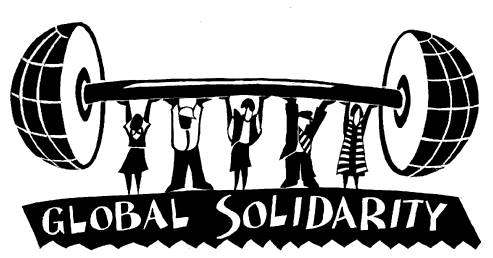
In a world that has been reshaped according to the needs of neoliberal capitalism, the impact of a global pandemic like COVID-19 can only be horribly intensified. This is certainly true in Canada, where governments have dragged their feet on timely responses to the threat to public health and where decades of austerity driven attacks on healthcare systems, have weakened the capacity to cope with the crisis. During the lockdown period that has now been belatedly embarked up, people risk loss of housing and must cope with hugely reduced income. Long after the immediate threat of illness has receded, the economic downturn that the pandemic has sparked and intensified will continue to cause great hardship.
It is necessary to consider, however, that Canada is a highly privileged country and, indeed, a global exploiter. This is not for a moment to deny that the impact of the pandemic will be deeply effected by the profound social and economic inequalities that exist in this society or to disregard the dreadful particular threat faced by Indigenous communities. However, in the poor and oppressed countries throughout the world, the situation is immeasurably worse than anything that will be experienced in the West. In Canada, governments worry about ‘flattening the curve’ so that those in need of hospital treatment, when they contract the Coronavirus, will not overwhelm the provincial healthcare systems. What might we say, then, about a country like Malawi, that presently has 25 ICU beds for a population of 17 million people or Bangladesh, with significantly less that one critical care bed per 100,000 people?
Western domination has gone over to a process of endless war. What prospects for withstanding the impact of the pandemic exist in Yemen, where hospitals have been destroyed and the population already faces hunger and disease? The deadly toll taken by the virus in Iran has mounted with the Trump Administration refusing to lift the life crushing sanctions it has imposed on the country. We can also consider the implications of large scale infection in desperately overcrowded and besieged Gaza where "A failing healthcare system, extreme poverty, dependence on humanitarian aid, dysfunctional infrastructure and harsh living conditions that compromise public health ... combine with overcrowding to form a nightmare scenario."
A particularly appalling aspect of the agenda of global oppression and exploitation has been the development of a huge refugee crisis. It was an international humanitarian disaster before the pandemic loomed over us but the threat to people in crowded camps or in transit as they struggle to reach places of safety, is now dire in the extreme. One million displaced Rohingya from neighboring Myanmar, wait in the world’s largest refugee camp, Cox’s Bazar in Bangladesh, for the virus to take root. The conditions in which they live make a mockery of the concept of physical distancing. Those trapped in the refugee camps in Greece are fully aware that ‘Coronavirus doesn’t respect borders or barbed wire’ and that they are desperately vulnerable. Italy has just declared its seaports ‘unsafe’ during the pandemic and is refusing the landing of rescue ships. “These restrictive measures will lead to mass fatalities at sea as people will continue to migrate. They have no other option,” declares a hotline service for refugees in distress at sea.
The pandemic lockdown will produce real hardship in Canada. Homeless people face abandonment, low wage precarious workers are under economic pressure to put themselves in harm’s way for their employers and millions have experienced a shattering loss of income. Yet, in poor countries, the lockdown is more than a hardship. Tens of thousands of migrant workers in India have been stranded, without any means of support, far from the communities they have travelled from. For hundreds of millions of people, the suspension of economic activity means the threat of starvation.
In the Global South, the economic downturn that will continue long after the danger of virus has subsided, will be utterly devastating. African economies are going to be incredibly vulnerable in any international downturn. ‘Not only are African countries fully integrated into the global economy, but many states are often playing a weak hand as exporters of commodities whose prices have been falling precipitously.’ Such a reverse has calamitous implications for countries with deeply impoverished populations. When Western based companies decide that it is not in there interests to exploit workforces in poor countries, they are more than ready to abandon them outright. Millions of garment workers in Bangladesh have already been put out to work by Western brand name companies that have no immediate need for their labour.
Global Solidarity
Though there may indeed be recurring waves of the present pandemic that continue to threaten public health and produce economic disruption, the global slump that is emerging will outlive the virus. We are going to be facing massive levels of unemployment and an austerity attack that will be far more extreme that anything the neoliberal period has produced so far. As the bill comes due for the emergency measures governments have taken and the vast corporate bailouts they have provided, public services will be targeted as never before. These attacks on the social infrastructure will be complemented by an effort to restore rates of profit by increasing the rate of exploitation and driving down wages.
The period that will unfold in the wake of the pandemic is going to produce mass struggles. As we take up these fights in a country like Canada, it is absolutely essential that we infuse the movements we build with a deep sense and a concrete practice of global solidarity. Defence of migrant workers and refugees can’t be an afterthought. We must challenge with serious political mobilization military attacks and life destroying sanctions that are imposed on poor countries. The international exploiters that are headquartered here, like the mining companies and the brand name parasites, have to be challenged. We have to forge deeper links and build a real international movement on a scale that the situation demands.
Capitalism and its world order stands indicted as a system based on such destructive irrationality that the needs of billions of people can’t be met under its domination. To challenge global capitalism we must build a movement of deep and powerful global solidarity.
